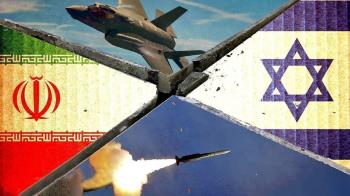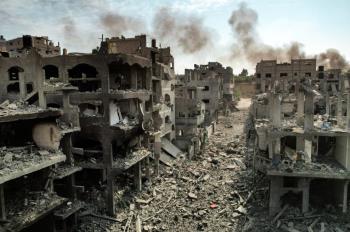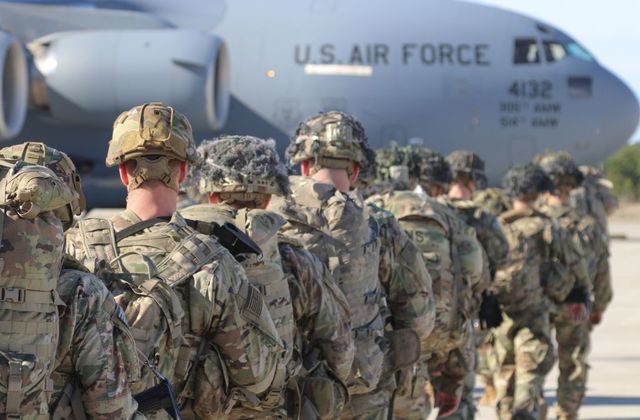Alwaght- While in run-up to the fourth round of the US-Iraq strategic talks in Washington the debate about a timetable for withdrawal of the American troops from Iraq is dominant among political groups and the public, Foreign Minister Fuad Hussein commented on the need for Iraqi military training under the supervision of the US. The Controversial remarks drew waves of objections and questions about implementation of the parliament bill to expel the foreign forces from the country in the forthcoming negotiations.
"We need to work with the International Coalition, led by the United States, against the terrorists of ISIS," Hussein alleged. "We need cooperation in the field of intelligence. We need help with training. We need troops to help us in the air.”
Erbil operation; Iraqi resistance stands to the last US soldier withdrawal
FM Hussein's remarks were met by strong reactions from anti-American groups active within the body of the Popular Mobilization Forces (PMF) who warned about "evil plans" underway to circumvent the parliament bill and highlighted their resolve to push until complete withdrawal of the foreign and US military presence in their country. The warning was a message to the government to correctly implement the bill to exercise national sovereignty and independence.
"The mission of the US air force in Iraq is to defend the security of the Zionist regime and to spy on the resistance," stated the Coordination Council of the PMF, referring to the groups and countries opposing the US dominance in Iraq and the region. The statement continued that the genuine withdrawal of the US from Iraq will take place only when its forces withdraw completely from Iraqi territory.
Qais al-Khazali, the secretary general of Asaeb Ahl al-Haq resistant movement in Iraq, in a Twitter post held that the presence of American troops in Iraq was against Iraq's interests and said that this presence, if it benefits," is in the interest of the Zionist regime which considers Iraq and the Iraqis its top enemy." Al-Khazali added that the comments by the FM were "very unfortunate and unacceptable for us and any Iraqi who is proud of the military and security institutions of this country."
Along with these developments, Al-Harir military base in Erbil in northern Iraq housing the US forces came under a "drone attack."
The Liwa Al-Thaerin news outlet in a Telegram post broke the news about the Friday attack.
"The attack, launched on 2 am Friday with combat drones, inflicted damages on the facilities of the American forces," the report read.
Undoubtedly, this operation and the warning stances taken by the anti-American groups carry the serious message that Washington's struggle to keep its troops on Iraqi soil under any title or agreement is unacceptable, and if such a scenario were to take place, the White House officials would only jeopardize the lives of their troops.
Last American tricks
Since the Iraqi members of parliament approved the foreign forces expulsion resolution that followed the assassination of Iran's top anti-terror General Qassem Soleimani and his Iraqi comrade, Abu Mahdi al-Muhandis the deputy commander of the PMF in January 2020, Washington left no stone unturned searching ways to circumvent the parliament bill.
One of the most important US strategies was to procrastinate by proposing to start strategic negotiations with the Iraqi government, which has gone through four stages so far. Al-Kadhimi critics argue the fourth round has begun while the main topic of the talks, the withdrawal of US troops from Iraq, is being sidelined. Moreover, given Iraq's major economic woes and popular protests in recent months and years, Washington officials have sought to fish in troubled waters shifting the negotiations to economic cooperation and making tempting promises of financial aid to Iraqis.
The US, which managed to return to Iraq in 2014 under the excuse of assistance by founding and sending ISIS to the Arab country using the Syrian and foreign terrorist fighters, over the past year has afresh used the same trick of destabilization of Iraq by facilitating terrorist activities. Since the parliament passed the bill, Iraq has witnessed a massive wave of attacks on economic infrastructure, agricultural lands, insecurity of transportation routes, and also attacks on diplomatic facilities. Observers agree the attacks "are designed" to instill among the Iraqis a sense of incompetence of the Iraqi forces to secure the country.
From ISIS emergence to fleeing Afghanistan: Historic lessons for Iraqis to learn
Amid efforts to legitimize the US military presence in Iraq under the title of training and advisory mission, the Iraqis have to learn from the US presence in Afghanistan that is a glaring failure story. The US and NATO for years undertook the responsibility to train and equip Afghanistan army with huge spending. But shortly after setting the plans for Western withdrawal, the Afghan forces lost a majority of their territories to the scantily-armed Taliban fighters.
Iraq had such an experience when ISIS emerged and the American-trained regular Iraqi army failed to hold its positions against ISIS militants who in a matter of days seized a hefty chunk of Iraqi territory and committed horrific crimes and executions. ISIS obliteration was possible only after the PMF and the Iraq's staunch ally Iran stepped in.
As over the past year the PMF and Iraqi army managed to nip in the bud the ISIS re-emergence scenario by relying on own training and capabilities, they now, too, do not need subordination and obedience to foreign forces.



























